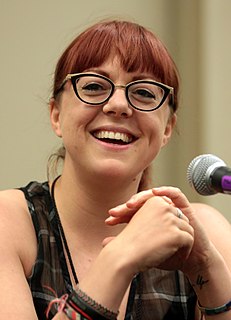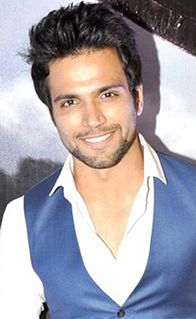A Quote by Patrick Rothfuss
Fantasy is my favorite genre for reading and writing. We have more options than anyone else, and the best props and special effects. That means if you want to write a fantasy story with Norse gods, sentient robots, and telepathic dinosaurs, you can do just that. Want to throw in a vampire and a lesbian unicorn while you're at it? Go ahead.
Related Quotes
I really wish that peoplewould just say, 'Yes, it's a comic. Yes, this is fantasy. Yes, this is Science Fiction,' and defend the genre instead of saying, 'Horror is a bit passe so this is Dark Fantasy,' and that' s playing someone else's game. So that's why I say I'm a fantasy writer and to hell with 'It doesn't read like what I think of as a fantasy'. In that case what you think of as a fantasy is not a fantasy. Or there is more to it than you think.
So many people think that if you're writing fantasy, it means you can just make everything up as you go. Want to add a dragon? Add a dragon! Want some magic? Throw it in. But the thing is, regardless of whether you're dealing with realism or fantasy, every world has rules. Make sure to establish a natural order.
Poetry restores language by breaking it, and I think that much contemporary writing restores fantasy, as a genre of writing in contrast to a genre of commodity or a section in a bookstore, by breaking it. Michael Moorcock revived fantasy by prying it loose from morality; writers like Jeff VanderMeer, Stepan Chapman, Lucius Shepard, Jeffrey Ford, Nathan Ballingrud are doing the same by prying fantasy away from pedestrian writing, with more vibrant and daring styles, more reflective thinking, and a more widely broadcast spectrum of themes.
If you are going to write, say, fantasy - stop reading fantasy. You've already read too much. Read other things; read westerns, read history, read anything that seems interesting, because if you only read fantasy and then you start to write fantasy, all you're going to do is recycle the same old stuff and move it around a bit.
I wish more fantasy, especially the dominant fantasy that draws heavily on British and Christian lore, would wrestle with its own ethnospecific nature and what that means when the story is set somewhere where more than one belief system is in operation. If all you do is pay lip service to it, you can get the kind of thing where the writer has thrown one Hindu god into a Christianist fantasy (rendering said god by default a demon or otherwise inferior to the dominant religious system of the story, which is such an insult), and the hero is able to vanquish it by chanting a spell in church Latin.
I've always been into 'fast-paced, don't bore 'em, keep it moving along, stick with the story.' You know: tell a story the way I want to hear a story. I find it more rewarding to write for kids, but I also find it a little easier, because you can just let loose a little bit more in terms of fantasy and stuff.



































